CORNELL NOW
Cornell Now–2015
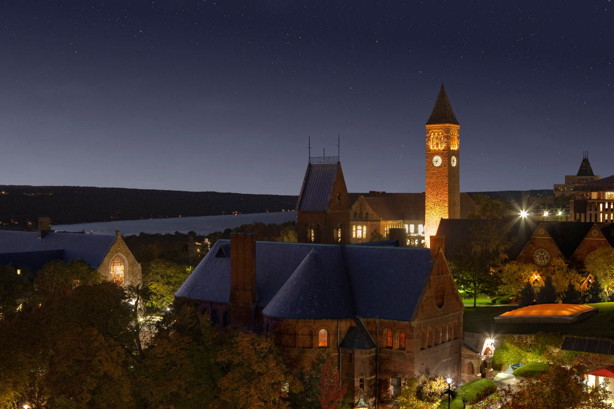
Campaign tops $4 billion
Cornell has surpassed an important fundraising-campaign milestone – $4 billion – making it only the fourth institution in all of higher education to have accomplished such a feat.
Since its public launch in 2006, "Cornell Now!" has raised $4.03 billion toward its goal of $4.75 billion by 2015, Cornell's sesquicentennial.
"Beginning with Ezra Cornell's founding gift in 1865, philanthropy has been the bedrock of the university, and gifts of all amounts continue to sustain and advance every part of this university's mission," said President David J. Skorton.
He added, "We have gathered tremendous momentum to reach this $4 billion milestone, and we are moving onward to meet – if not exceed – our target goal for 'Cornell Now' by 2015."
The campaign has received 617,618 gifts from 154,751 alumni, parents and friends – ranging from a contribution of a single penny to multimillion-dollar gifts. The funds support both the Ithaca campus and Weill Cornell Medical College in New York City and includes the medical college's recently completed $1.3 billion "Discoveries That Make a Difference" campaign.
At the same time, Cornell NYC Tech recently reached a fundraising milestone of its own. "Thanks to a generous gift from Class of '54 alumni Joan and Irwin Jacobs [announced April 15], our efforts for the tech campus have crossed the $500 million mark," said Charles Phlegar, vice president for alumni affairs and development. "Together, these campaigns bring Cornell's fundraising progress to more than $4.5 billion."
In addition to supporting the construction of facilities across the Ithaca campus, the "Cornell Now!" campaign has bolstered faculty renewal and led to the establishment, so far, of 92 endowed faculty chairs and professorships, including 41 at Weill Cornell, and recruited 36 sesquicentennial faculty fellows through current-use Faculty Renewal Sesquicentennial Challenge funds.
The "Cornell Now!" campaign also has significantly strengthened Cornell's financial aid and scholarship programs (including 504 new endowed undergraduate scholarships and more than $30 million to support medical student scholarships), and supports such key universitywide initiatives as international programs, service learning and public engagement.
First-class business education for U.S. veterans
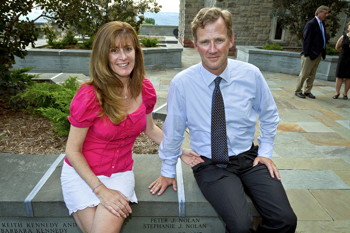
Stephanie and Peter Nolan. Photo: Chris Kitchen See larger image
Since it was established by the couple in 2007, the Peter and Stephanie Nolan Veterans Scholarship, a current-use fund, has allocated nearly $1 million to support the studies of 27 students at the Samuel Curtis Johnson Graduate School of Management.
The scholarship for MBA students at Johnson was originally established for U.S. military veterans of the wars in Iraq and Afghanistan, but has since been opened to all U.S. military veterans.
Inspired by the impact their scholarship has already had on Johnson and the Nolan Veteran Scholars, Peter '80, MBA '82, and Stephanie Nolan made a new gift earlier this spring to provide an additional $1 million, extending the life of the scholarship for another five years.
The Nolans knew beforehand that their scholarship would be good for the school and the veterans. "It's repaying a debt of gratitude for people's service to the country," Peter Nolan said in 2008. And: "I used to be in investment banking, and the people we hired who were ex-military were outstanding employees. I thought that Cornell could benefit from that."
The Nolan Veterans Scholarship has since had a snowball effect. By making Johnson especially competitive with other top business schools in attracting veteran applicants, Cornell is now known among veterans as a go-to school: "At the other schools," explains Kima McCoy, MBA '11, "there would be one veteran who reached out, but here, they have an armada."
The current class of Nolan Veteran Scholars includes two Marines, two Army Rangers, a field artillery officer, a military intelligence officer and an aviator. All served in either Iraq or Afghanistan or both.
For the Class of 2014, Johnson received an impressive 57 applications from veterans, 23 of whom were offered admission and 12 of whom enrolled.
One veteran who enrolled was Patrick George '13; he joined the Marines because of the terrorist attacks on Sept. 11, 2001. He spent four years as an infantry officer in the Marine Corps and completed two tours in Iraq. On his second tour, he was the operations officer in charge of advising the Iraqi border police along the Jordanian and Syrian borders. After visiting Cornell, he knew it was his first choice, but "my G.I. benefits only go so far and Johnson was just out of reach," he says. The Nolan Veterans Scholarship opened Cornell's doors to him.
Donors respond to successful match campaign
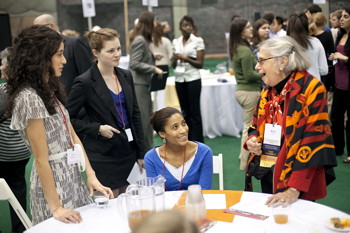
Students at TCAM scholarship dinner. See larger image
In his State of the University address to the board of trustees and university council in 2008, during the worst days of the Great Recession, President David Skorton pledged his commitment to financial aid: "I realize that this is one of several priorities in the [fundraising] campaign, but it is the one that, with your help, I intend to make a hallmark of my presidency."
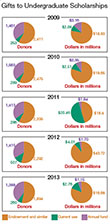
Infographic. See larger image
With permission from the board of trustees, Skorton committed $12.5 million in university matching funds (in addition to the tens of millions Cornell spends every year to provide more than half its students with financial aid) to leverage $37.5 million in new gifts to scholarship.
The match required that donors make a gift of at least $75,000, which Cornell augments with $25,000.
Cornellians and friends answered the call, in droves. Fundraising for scholarships saw a major spike during the time the challenge was in effect – from 2009 through early 2013. Gifts made to the challenge match made up 22 percent of all gifts to scholarship over that period.
Two hundred and seventy-five new scholarships have been created through the challenge. Because the scholarships are endowed – meaning their principal will remain untouched while a payout (now set at 4.5 percent) goes to defray their scholars' educational costs – these new scholarships will support Cornell undergraduates every year in perpetuity and will grow in value as the university's endowment grows.
New Cornell U.K. charity
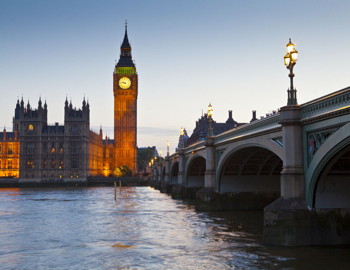
London scence. Photo: Matthew Dixon See larger image
In April, Martin Byman, J.D. '83, and Margaret Samson, J.D. '83, became the first donors to the newly established Cornell University Foundation (U.K.) Ltd., a Cornell-owned charity registered in the United Kingdom and recognized in the United States. The couple, who have dual U.S.-U.K. citizenships, have lived in London for more than 12 years. They have annually supported the Cornell Law School, where they first met as students while working for the Cornell Law Review.
"In the past, we've been making gifts to the university through the Charities Aid Foundation. Now, we can give to the new Cornell U.K. Foundation and are delighted that our recent multiyear commitment to benefit the law school's annual fund happened to be the first gift," says Samson.
Through the foundation, U.K. taxpayers can donate to Cornell while taking advantage of U.K. tax incentives. Among these is the Gift Aid scheme, a policy that enables U.K.-registered charities to claim the basic-rate tax for a gift, increasing the value of that donation. Additionally, donors also subject to U.S. taxes may claim a charitable income tax deduction from the I.R.S. for the same Gift Aid-enhanced contribution.
For more information about Gift Aid and the Cornell University Foundation (U.K.) Ltd., visit www.giving.cornell.edu/uk/.
– Items written by Emily Sanders Hopkins and Jose Perez Beduya